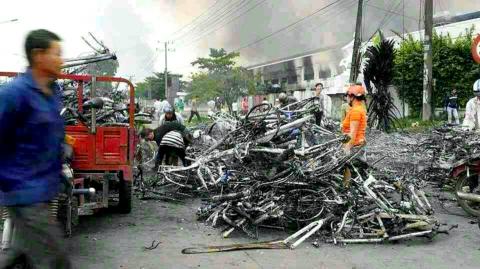Government officials yesterday rejected Beijing’s call for cross-strait cooperation on dealing with territorial disputes in the South China Sea, pledging not to take sides in any dispute involving claimants.
Minister of Foreign Affairs David Lin (林永樂) told a legislative meeting that the government “sees no room for cooperation with mainland China on South China Sea issues.”
He was answering questions by lawmakers on the government’s response to Taiwan Affairs Office spokesperson Ma Xiaoguang (馬曉光), who on Wednesday renewed calls for cross-strait cooperation on the issue amid ongoing anti-China protests in Vietnam sparked by China’s installation of an oil rig in waters also claimed by Vietnam.

Photo provided by Greater Tainan Councilor Wang Ting-yu
As hundreds of Taiwanese-invested firms were engulfed in the protests in Binh Duong and Dong Nai provinces, Ma told a press conference that China was awaiting Taiwan’s response to its call for cross-strait initiatives in dealing with the issue.
Ma did not elaborate on the content of the initiatives, but said Beijing had presented the proposal to Taiwan through official and unofficial channels.
Ma on Wednesday said that the islands in the South China Sea and their adjacent waters are inherent territory of China and that safeguarding the nation’s sovereignty and its territory as well as maintaining the overall interests of “zhonghua minzu (中華民族)” is a “responsibility that lies with people on both sides of the [Taiwan] Strait.”
Several lawmakers expressed concern that having Taipei and Beijing join hands in asserting sovereignty over the region could have serious repercussions on Taiwan’s relations with other South China Sea claimants and their allies.
Chinese Nationalist Party (KMT) Legislator Johnny Chiang (江啟臣) said that cooperation between Taiwan and China on the territorial disputes “could widen the chasm of misunderstanding among Vietnamese people against Taiwan.”
The misunderstanding is already there and is partly responsible for the protests targeting Taiwanese-invested businesses, Chiang said.
KMT Legislator Lu Shiow-yen (盧秀燕) suggested that the government seek to establish diplomatic relations with countries engaged in confrontation with China over territorial issues, such as Vietnam and the Philippines, with the help of the US and Japan to allay doubts they might have about Taiwan siding with China on the disputes.
“You should bring up the issue with the US to turn the crisis into an opportunity,” Lu said.
National Security Bureau Director-General Lee Hsiang-chou (李翔宙) dismissed Lu’s suggestion, saying that Taiwan should “stay neutral on any conflict between two [or more] parties in a territorial dispute.”
Any countries involved in a territorial dispute should seek to have the dispute resolved in accordance with international law, Lee said.
“We are not a troublemaker, but a peacemaker. We would like to see countries embrace the spirit of the East China Sea Peace Initiative to handle the dispute in the South China Sea,” Lee said, referring to President Ma Ying-jeou’s (馬英九) proposal to have the Diaoyutai Islands (釣魚台) issue, with Taiwan, China and Japan laying claim to the islands, peacefully resolved through dialogue.
Lin said that the cross-strait relationship is of equal importance to the nation’s relationship with the US, Japan, the Philippines and Vietnam.
The ministry will spare no efforts to elevate Taiwan’s relationships with these countries, but when it comes to the establishment of diplomatic ties, “the international reality facing our country needs to be taken into consideration,” Lin said.

Alain Robert, known as the "French Spider-Man," praised Alex Honnold as exceptionally well-prepared after the US climber completed a free solo ascent of Taipei 101 yesterday. Robert said Honnold's ascent of the 508m-tall skyscraper in just more than one-and-a-half hours without using safety ropes or equipment was a remarkable achievement. "This is my life," he said in an interview conducted in French, adding that he liked the feeling of being "on the edge of danger." The 63-year-old Frenchman climbed Taipei 101 using ropes in December 2004, taking about four hours to reach the top. On a one-to-10 scale of difficulty, Robert said Taipei 101

Nipah virus infection is to be officially listed as a category 5 notifiable infectious disease in Taiwan in March, while clinical treatment guidelines are being formulated, the Centers for Disease Control (CDC) said yesterday. With Nipah infections being reported in other countries and considering its relatively high fatality rate, the centers on Jan. 16 announced that it would be listed as a notifiable infectious disease to bolster the nation’s systematic early warning system and increase public awareness, the CDC said. Bangladesh reported four fatal cases last year in separate districts, with three linked to raw date palm sap consumption, CDC Epidemic Intelligence

US climber Alex Honnold left Taiwan this morning a day after completing a free-solo ascent of Taipei 101, a feat that drew cheers from onlookers and gained widespread international attention. Honnold yesterday scaled the 101-story skyscraper without a rope or safety harness. The climb — the highest urban free-solo ascent ever attempted — took just more than 90 minutes and was streamed live on Netflix. It was covered by major international news outlets including CNN, the New York Times, the Guardian and the Wall Street Journal. As Honnold prepared to leave Taiwan today, he attracted a crowd when he and his wife, Sanni,

Taiwanese and US defense groups are collaborating to introduce deployable, semi-autonomous manufacturing systems for drones and components in a boost to the nation’s supply chain resilience. Taiwan’s G-Tech Optroelectronics Corp subsidiary GTOC and the US’ Aerkomm Inc on Friday announced an agreement with fellow US-based Firestorm Lab to adopt the latter’s xCell, a technology featuring 3D printers fitted in 6.1m container units. The systems enable aerial platforms and parts to be produced in high volumes from dispersed nodes capable of rapid redeployment, to minimize the risk of enemy strikes and to meet field requirements, they said. Firestorm chief technology officer Ian Muceus said